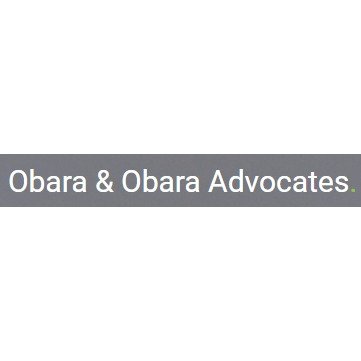Best Tax Lawyers in Kenya
Share your needs with us, get contacted by law firms.
Free. Takes 2 min.
Or refine your search by selecting a city:
List of the best lawyers in Kenya
Legal guides written by Adroit Law LLP:
- Kenya Launches Digital Nomad Visa: A Gateway for Remote Workers
- Navigating the Payment System License Maze in Kenya
- Navigating the Complexities of Mining Licenses and Permits in Kenya: A Look into Artisanal and Large-Scale Operations
About Tax Law in Kenya
Tax Law in Kenya is governed by several statutes, the most notable being the Income Tax Act, the Value Added Tax Act, the Excise Duty Act, and the Tax Procedures Act. These laws outline the taxation responsibilities for individuals and businesses within the country, aiming to ensure compliance while facilitating socio-economic growth. The tax system in Kenya is administered by the Kenya Revenue Authority (KRA), under the Ministry of Finance. With a mix of direct and indirect taxes, the system requires regular updates and compliance to avoid penalties or legal complications.
Why You May Need a Lawyer
There are numerous situations where individuals or businesses may require legal assistance in tax matters:
- Tax Disputes: If you are facing a dispute with the KRA over tax assessments, an experienced tax lawyer can help navigate the legal system and provide representation.
- Tax Planning and Compliance: Ensuring compliance with tax obligations can be complex. A lawyer can offer advice on tax planning, helping to manage liabilities efficiently.
- Business Transactions: Mergers, acquisitions, and reorganizations can have significant tax implications. Legal advice is crucial in such transactions to minimize tax burdens and ensure compliance.
- PENALTIES AND INTERESTS: If you have been penalized for non-compliance, a lawyer can assist in negotiating settlements or challenging unfair penalties.
- Filing Appeals: In the case of an unfavorable decision by the Tax Tribunal, you may need legal expertise to file an appeal and represent your case.
Local Laws Overview
Kenya's tax laws are designed to ensure all eligible taxpayers contribute to national revenue. Here are key aspects:
- Income Tax: Governed by the Income Tax Act, it applies to income of individuals and corporations, with specific rates and allowances.
- Value Added Tax (VAT): An indirect tax on goods and services, pegged at a standard rate of 16%, though some goods and services can be zero-rated or exempted.
- Excise Duty: Levied on specific goods produced or imported into Kenya, such as alcohol, tobacco, and petroleum products.
- Customs Duty: Applies to goods entering Kenya, with rates determined by the East African Community (EAC) tariff code.
- Tax Incentives: Various incentives are available to encourage investment, including capital deductions and exemptions under the Special Economic Zones Act.
Frequently Asked Questions
What is the personal income tax rate in Kenya?
The personal income tax rate for resident individuals is progressive, ranging from 10% to 30%, depending on one's income bracket.
How does the PAYE system work?
Pay As You Earn (PAYE) is a method through which employers deduct income tax from employees’ salaries or wages before they are paid.
What is the deadline for filing tax returns in Kenya?
Individuals and businesses must file their annual tax returns by June 30th each year.
How do I register for a Personal Identification Number (PIN) in Kenya?
You can register for a PIN on the KRA iTax portal, a crucial step as it serves as your tax identification.
Can I get tax relief on pension contributions?
Yes, contributions to registered pension schemes are eligible for tax relief up to certain limits, promoting retirement savings.
What qualifies as tax-exempt income?
Income from certain employment-related benefits like some retirement benefits and reimbursed medical expenses may be exempt, subject to conditions.
Are foreigners required to pay tax in Kenya?
Yes, foreigners earning income from within Kenya are required to pay tax, subject to applicable double taxation agreements.
What are the penalties for late submission of tax returns?
Penalties include a fine which may amount to 5% of the tax due or Kshs 20,000, whichever is higher, plus interest on unpaid taxes.
What is VAT withholding?
It's a mechanism where a portion of VAT is withheld by appointed agents when paying suppliers and then remitted to the KRA.
What avenues exist for resolving tax disputes?
You can resolve disputes through the Tax Appeals Tribunal before escalating to higher courts if necessary.
Additional Resources
Below are resources and organizations that can provide further assistance:
- Kenya Revenue Authority (KRA): The main authority responsible for tax administration. Their website provides comprehensive resources and FAQs.
- The Tax Appeals Tribunal: Provides a platform for resolving tax disputes.
- Institute of Certified Public Accountants of Kenya (ICPAK): Offers guidance on best practices regarding accounting and tax compliance.
- Kenya Law Reports: Provides access to laws and legal notices, including tax legislation.
Next Steps
If you need legal assistance with tax issues in Kenya, it's advisable to:
- Consult a Tax Lawyer: Start by finding a lawyer specialized in tax law to assess your case.
- Gather Documentation: Collect all relevant financial records and correspondence with the KRA or other bodies.
- Schedule a Consultation: Many lawyers offer initial consultations. Use this to discuss your case and understand the potential costs.
- Understand Your Options: Your lawyer will help outline your options, whether it involves negotiation, litigation, or tax planning.
- Keep Informed: Stay updated on tax regulations and your obligations to prevent future issues.
Lawzana helps you find the best lawyers and law firms in Kenya through a curated and pre-screened list of qualified legal professionals. Our platform offers rankings and detailed profiles of attorneys and law firms, allowing you to compare based on practice areas, including Tax, experience, and client feedback.
Each profile includes a description of the firm's areas of practice, client reviews, team members and partners, year of establishment, spoken languages, office locations, contact information, social media presence, and any published articles or resources. Most firms on our platform speak English and are experienced in both local and international legal matters.
Get a quote from top-rated law firms in Kenya — quickly, securely, and without unnecessary hassle.
Disclaimer:
The information provided on this page is for general informational purposes only and does not constitute legal advice. While we strive to ensure the accuracy and relevance of the content, legal information may change over time, and interpretations of the law can vary. You should always consult with a qualified legal professional for advice specific to your situation.
We disclaim all liability for actions taken or not taken based on the content of this page. If you believe any information is incorrect or outdated, please contact us, and we will review and update it where appropriate.
Browse tax law firms by city in Kenya
Refine your search by selecting a city.

















